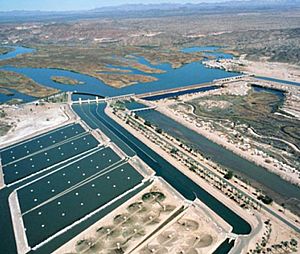Imperial Dam facts for kids
Quick facts for kids Imperial Dam |
|
|---|---|
 |
|
| Official name | Imperial Diversion Dam |
| Location | Lower Colorado River Valley Imperial County, California Yuma County, Arizona |
| Coordinates | 32°52′59″N 114°27′54″W / 32.883056°N 114.465°W |
| Construction began | 1936 |
| Opening date | 1938 |
| Operator(s) | Bureau of Reclamation |
| Dam and spillways | |
| Impounds | Colorado River |
| Height | 85 ft (26 m) |
| Length | 3,475 ft (1,059 m) |
| Width (base) | 76 ft (23 m) |
| Reservoir | |
| Creates | Imperial Reservoir |
| Total capacity | 160,000 acre⋅ft (200,000,000 m3) (now silted) |
| Surface area | 5,756 acres (2,329 ha) |
The Imperial Diversion Dam is a large concrete dam built across the Colorado River. It sits right on the border between California and Arizona, about 18 miles northeast of Yuma, Arizona. Finished in 1938, this dam helps to hold back the Colorado River's water, creating the Imperial Reservoir. Its main job is to clean the water and then send it to different places through canals. This water is super important for farms and cities in the area. Before this dam was built, the Imperial Irrigation District used other canals to get water.
What Does the Imperial Dam Do?
The Imperial Dam has three main sections. Each section has gates that hold back the water. This helps to guide the water towards a special cleaning area called a desilting plant.
How the Dam Cleans Water
The dam has three huge basins where the water is cleaned. These are called desilting basins. Inside, there are 72 giant scrapers, each about 770 feet long. These scrapers help to remove the silt, which is like fine mud or sand, from the water.
Once the silt is removed, it's carried away by six special pipes. These pipes run under the Colorado River and dump the silt back into the river, but in a different spot. This way, the silt doesn't clog up the canals. After being cleaned, the water is sent back to one of the three dam sections. From there, it's directed into one of three main channels.
About 90% of all the water from the Colorado River is sent into these canals at this spot! The amount of water diverted can be huge, sometimes more than 40,000 cubic feet per second. That's more water than many large rivers carry.
Where Does the Water Go?
The cleaned water from the Imperial Dam goes to different places:
- The Gila River and the Yuma Project aqueduct carry water towards Arizona.
- The All-American Canal branches off to the south. It travels about 37 miles before reaching the California border. Then, it turns west towards the Imperial Valley in California. This canal is vital for farming in the Imperial Valley.
 | Lonnie Johnson |
 | Granville Woods |
 | Lewis Howard Latimer |
 | James West |

